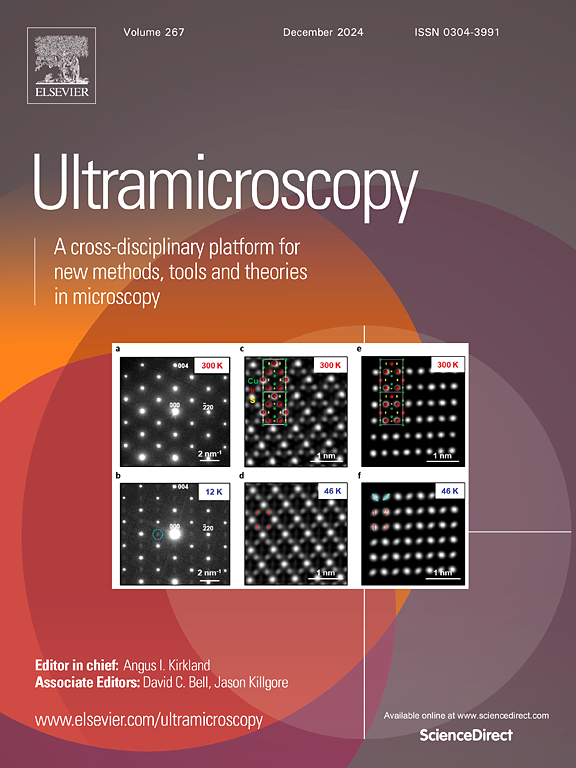Toward quantitative thermoelectric characterization of (nano)materials by in-situ transmission electron microscopy
IF 2
3区 工程技术
Q2 MICROSCOPY
引用次数: 0
Abstract
We explore the possibility to perform an in-situ transmission electron microscopy (TEM) thermoelectric characterization of materials. A differential heating element on a custom in-situ TEM microchip allows to generate a temperature gradient across the studied materials, which are simultaneously measured electrically. A thermovoltage was induced in all studied devices, whose sign corresponds to the sign of the Seebeck coefficient of the tested materials. The results indicate that in-situ thermoelectric TEM studies can help to profoundly understand fundamental aspects of thermoelectricity, which is exemplary demonstrated by tracking the thermovoltage during in-situ crystallization of an amorphous Ge thin film. We propose an improved in-situ TEM microchip design, which should facilitate a full quantitative measurement of the induced temperature gradient, the electrical and thermal conductivities, as well as the Seebeck coefficient. The benefit of the in-situ approach is the possibility to directly correlate the thermoelectric properties with the structure and chemical composition of the entire studied device down to the atomic level, including grain boundaries, dopants or crystal defects, and to trace its dynamic evolution upon heating or during the application of electrical currents.
利用原位透射电子显微镜对(纳米)材料进行定量热电表征。
我们探索了对材料进行原位透射电子显微镜(TEM)热电特性分析的可能性。在定制的原位 TEM 微芯片上安装一个差分加热元件,可以在所研究的材料上产生温度梯度,并同时进行电学测量。在所有研究装置中都会产生热电压,其符号与被测材料塞贝克系数的符号相对应。结果表明,原位热电 TEM 研究有助于深刻理解热电的基本方面,非晶态 Ge 薄膜原位结晶过程中的热电压跟踪就是一个很好的例子。我们提出了一种改进的原位 TEM 微芯片设计,它有助于对诱导温度梯度、电导率和热导率以及塞贝克系数进行全面的定量测量。原位方法的优势在于可以直接将热电性能与整个被研究器件的结构和化学成分(包括晶界、掺杂物或晶体缺陷)关联到原子水平,并跟踪其在加热或施加电流时的动态演变。
本文章由计算机程序翻译,如有差异,请以英文原文为准。
求助全文
约1分钟内获得全文
求助全文
来源期刊

Ultramicroscopy
工程技术-显微镜技术
CiteScore
4.60
自引率
13.60%
发文量
117
审稿时长
5.3 months
期刊介绍:
Ultramicroscopy is an established journal that provides a forum for the publication of original research papers, invited reviews and rapid communications. The scope of Ultramicroscopy is to describe advances in instrumentation, methods and theory related to all modes of microscopical imaging, diffraction and spectroscopy in the life and physical sciences.
 求助内容:
求助内容: 应助结果提醒方式:
应助结果提醒方式:


